| Reviews & Columns |
|
Reviews DVD TV on DVD Blu-ray 4K UHD International DVDs In Theaters Reviews by Studio Video Games Features Collector Series DVDs Easter Egg Database Interviews DVD Talk Radio Feature Articles Columns Anime Talk DVD Savant Horror DVDs The M.O.D. Squad Art House HD Talk Silent DVD
|
DVD Talk Forum |
|
|
| Resources |
|
DVD Price Search Customer Service #'s RCE Info Links |
|
Columns
|
|
|
Jeffersons - The Complete Series: The Dee-Luxe Edition, The
Dee-lightful! Shout! Factory, the white knight of abandoned vintage TV-on-DVD series, has released The Jeffersons - The Complete Series: The Dee-Luxe Edition, a 6-volume, 33-disc, 253-episode collection of the classic CBS sitcom. A spin-off of Norman Lear's seminal sitcom, All in the Family, The Jeffersons never got the respect it deserved from critics (nor even from Lear, frankly) during its impressive ten and a half seasons run, but audiences couldn't have cared less--the reason being the simplest of all: it was reliably, predictably, reassuringly funny, season after season. Now, all of The Jeffersons' episodes have been gathered together in one compact package--much to the consternation of those who bought the first six stand-alone season sets...only to be left high and dry for seven years. Still...this touchy release situation is better than worse, particularly since the drumbeat for releasing the entire series has been so strong over the past few years (once the bitching is over, that 74 hour-long Jeffersons boxed set is gonna look mighty fine under your Christmas tree...). A few (very) minor bonuses are included to sweeten the deal, such as a featurette on the show's production, and some crossover episodes The Jeffersons's characters shared with other series (there's also an essay by Tom Shales in the episode guide booklet, but I wouldn't call that a bonus...). Shout! didn't do any restorations here, but run times look complete for these fullscreen transfers. Now...let's look at every single episode ever made of The Jeffersons!
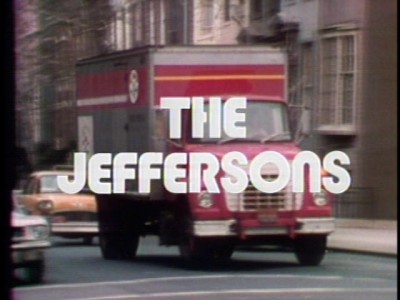
Actually, let's not (I heard that sigh of relief...). If you've read my TV reviews over the years here at DVDTalk, then you'll have noticed that for the most part, I try and comment on every episode of whatever season of a series I'm reviewing--and sometimes every episode for the entire series, if a complete set comes along. I could have done that here with The Jeffersons--I had a lot of fun watching all of it--but quite frankly: why would I do that? I've written twice before about The Jeffersons, when I reviewed first its sixth season, and then its first half-season for The Norman Lear Collection boxed set. And what I had to say about the show, still holds today.
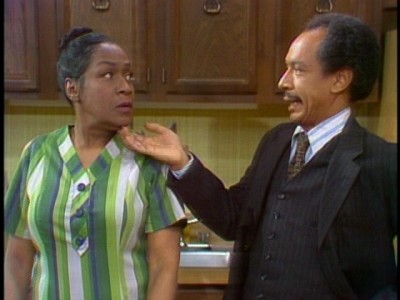
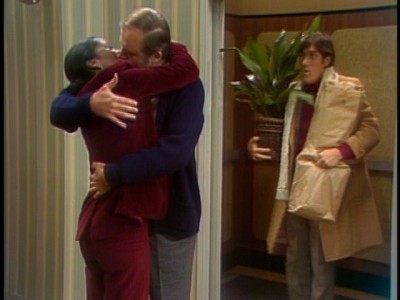
When All in the Family hit the airwaves at midseason in 1971, the first rumblings of a seismic evolution in what television could say and do occurred, and no question about it, producer Norman Lear was responsible for this (and some would say Lear's partner, Bud Yorkin, too...although Lear doesn't mention him so often). Now it's true that Lear's two greatest hits--All in the Family and Sanford and Son--were actually Americanized reworkings of already established hit British TV series, and that most subsequent outings in the Lear canon were spin-off variations of these previous basic formulas. However, he oversaw the producers and writers and incredibly talented casts that made shows like Maude, Good Times, The Jeffersons, and Mary Hartman, Mary Hartman so memorable, so he gets the credit for orchestrating, essentially, a new way of looking at television.
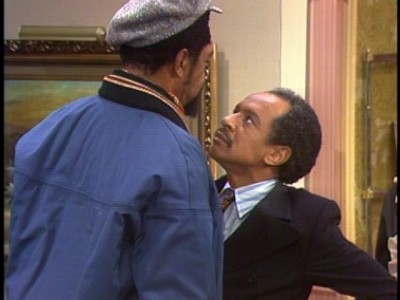
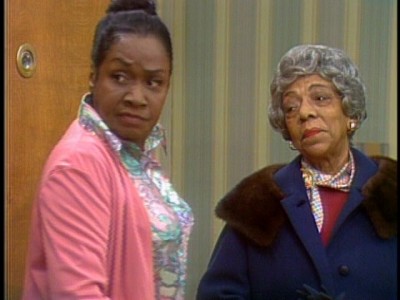
The basic premise for The Jeffersons' "movin' on up," according to Norman Lear, came from the Black Panthers (I would recommend reading Mr. Lear's latest book with an enormous grain of salt at the ready). If you were one of the tens of millions of viewers who tuned into All in the Family during that first 1971 half-season, then you'd know that outside of the heated Bunker-Stivic household, the changing dynamics of America beyond Archie's domain of easy chair, TV, and flushing toilet, was represented by black next-door-neighbors, the Jeffersons: sweet-tempered, loving Louise Jefferson (Isabel Sanford), the best friend of Archie's "dingbat" wife, Edith; Louise's ingratiating, stealth smart-assed college student son, Lionel (Mike Evans), and Louise's husband George...who wasn't actually seen until 1973. Instead, George's brother, Henry (Mel Stewart), represented the racial irritant to Archie's bigoted complacency. The reason George was only mentioned and not seen during those first seasons was due to the fact that Lear had always wanted Broadway star Sherman Hemsley to play George, but had to wait out Hemsley's Purlie contract before he could cast him. Once that happened, Hemsley's pint-sized, cock-sure, bragging racist George became an eagerly-anticipated, "breakout" element of the show, a supporting player, along with Sanford (who played beautiful straightman counterpoint to Hemsley), that Lear knew could carry his own show.
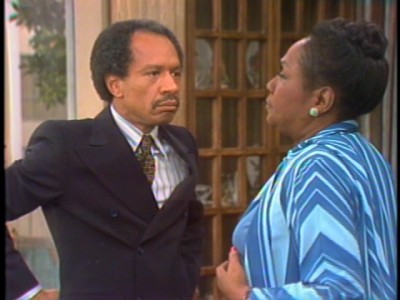
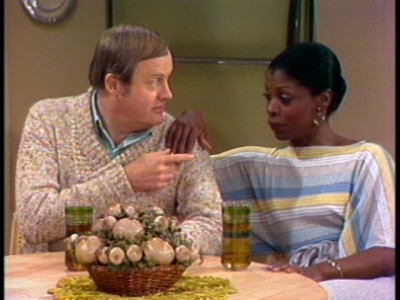
When trying to determine what the show's format would be, Lear remembers getting a light bulb about the Jeffersons finally achieving real wealth and moving to a high-rise...from none other than the Black Panthers, "a militant civil rights group from the sixties and seventies," three of whom supposedly stormed his office one day (a charmingly euphemistic label for a deadly terrorist organization that didn't just disappear in the '70s...which Mr. Lear would know if he was forced to vote at one of Our Dear Leader's more lively polling places). Launched as a mid-season replacement in January, 1975 (replacing the excellent, high-rated...but apparently not highly-enough rated Grant Tinker/Mary Tyler Moore series, Paul Sand in Friends and Lovers), The Jeffersons, heralded by that stone-cold groove theme song, entered the famed CBS Saturday night line-up for 1974-1975 : All in the Family, The Jeffersons, The Mary Tyler Moore Show, The Bob Newhart Show, and The Carol Burnett Show. With just 13 short episodes, The Jeffersons became the fourth most-watched series of the entire season. It would run for ten more full seasons, many of them Nielsen winners, beating out All in the Family in terms of longevity to become Norman Lear's longest running show.
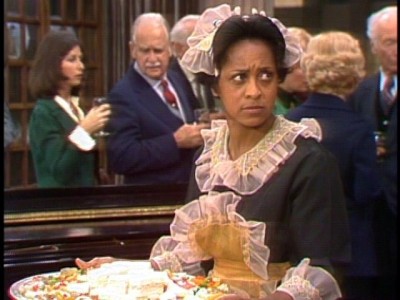
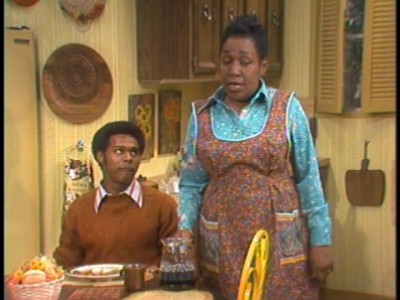
So...why no critical love for The Jeffersons? It certainly wasn't that solid premise...or was it? Writers/producers Mickey Ross, Don Nicholl, and Bernard West, the real creators of The Jeffersons, took Archie's neighbors and transported them to New York's toney East Side, in a "dee-luxe apartment in the sky." George Jefferson, a venal, grasping businessman with a string of laundry stores (including one in their new apartment building), may have been (at first) as much of a bigot as Archie Bunker, but he didn't care what color his customers where...as long as the money they kept paying him was green. Kindly Louise, still adjusting to the notion that she was now relatively rich, and so free to live a life of leisure, couldn't get used to having her own maid, Florence (Marla Gibbs), a sassy wise-ass who took no end of pleasure in sparring with the equally contemptuous George. And if that wasn't enough, Louise had to deal with George's acid-tongued mother, Olivia "Mother" Jefferson (Zara Cully), who never wasted an opportunity to slyly dig at Louise, whom Mother Jefferson didn't think was nearly good enough for her precious George. At least Louise had made friends with the Jeffersons' odd next-door neighbor, Mr. Bentley (Paul Benedict), a Britisher working at the U.N.. George could handle the too-upbeat Bentley (he just slammed the door in his face whenever he showed up), but Louise's other new friends--interracial couple Helen and Tom Willis (Roxie Roker and Franklin Cover)--drove George crazy. Even worse, the Willis' biracial daughter, Jenny (the gorgeous Berlinda Tolbert), was soon dating George's and Louise's handsome son, Lionel (Mike Evans, Damon Evans). George's prejudice against whites and that "zebra" Jenny didn't stop him, though, from courting the rich, powerful, influential whites who lived in his apartment building--the whites who could potentially help him climb even higher on the ladder of success.
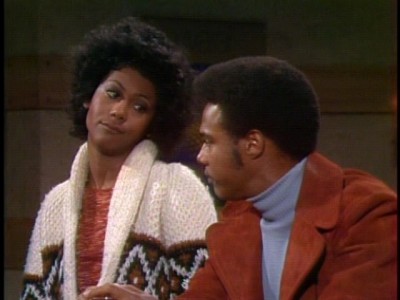
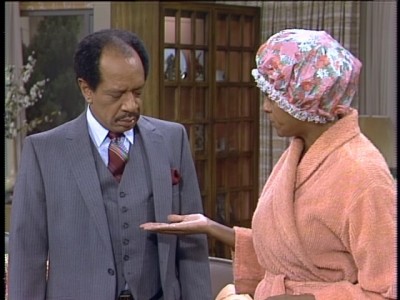
Sounds like potentially rich fodder for Lear's patented mixture of one-sided social commentary and one-liners, right? Wrong. Sure, The Jeffersons touched on themes and concerns that could be found over on All in the Family (Lear and guys like Tom Shale now seem at pains to somehow "justify" The Jeffersons's comedy by saying it really was all about "the messages" after all). However, The Jeffersons didn't do that nearly as often as the Bunkers did, and when they did, the tone was still laughs first, message second (something that wasn't always the case over at AITF, where events were becoming positively morose at times as its seasons wore on--would The Jeffersons ever have had an episode where Louise was almost raped?). There was no possible way for The Jeffersons to be anything but a light farce because of its construction. In short--nothing truly bad was going to happen to the Jeffersons the way viewers at home understood "bad": layoffs, evictions, electricity shut off, heating bill too high to pay, a clunker car finally breaking down for good, food prices skyrocketing with little left over at the end of the month to buy anything (welcome to America, 2014). The Jeffersons were rich. What was going to happen to them that was akin to what the lower working class Bunkers faced every paycheck, or to the one-dollar-away-from-outright-poverty Evanses over on Lear's Good Times? Nothing, that's what. The Jeffersons had made it. They had "moved on up," and George knew it. That's why he was always crowing and smiling. A continual appreciation for where the Jeffersons wound up, rather than always bitterly looking back at how hard things used to be, marked George's overall attitude (dangerous heresy in today's world of deliberately fomented discontent). Even the look of the series spelled "bouncy." Whereas the cramped, moldering brown and yellowed Bunker household looked exactly like its inhabitants' namesake over on All in the Family--as dingy and serious as some of its harsher storylines--George's and Louise's luxury high-rise apartment was bright and spacious and airy...just like The Jeffersons' comedy.
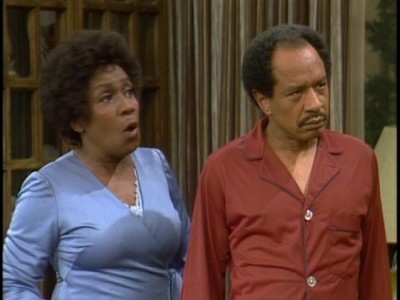
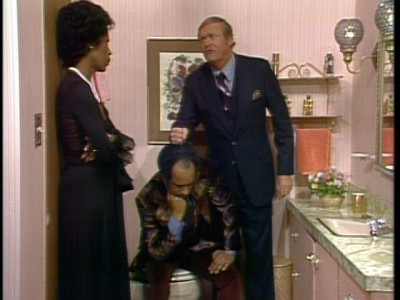
The character of George Jefferson is often thought of as a black version of Archie Bunker, but the set-up here mitigates a lot of the sting of George's racism--racism that eventually fades as the seasons wear on (an admirable demand by Hemsley, who insisted quite early in the run that George "evolve"). After all, the Jeffersons don't live in a cramped, rundown "neighborhood" like Archie, but rather in a high rise, where their immediate neighbor is an Englishman who is removed from America's racial history. George's other neighbors are rarely seen, but they take him for what he is: rich. He may be black, and some may not like that, but he's rich first, just like themselves. The interracial Willises provide a convenient target for George's racism (it's directed at other blacks, as well as whites--George throws around "nigger" as much as "honky"). Eventually, however, he becomes as tolerant of them as he is of Mr. Bentley, whom he seems to genuinely like...when he's not slamming the door in his face in mid-sentence (which happens constantly). Above all else for George, money seems to be his key motivating factor. He may call Louise's Uncle Walt a "Tom" in one early episode, but Walt correctly counters that George is no different when he kowtows to the rich whites for their money and influence. Money and status are everything to George...until, of course, family matters supersede that craving for success, and his true colors (if you will) are shown. Eventually, he turns out to be no different than Archie in that his family comes first, regardless of his prejudices.
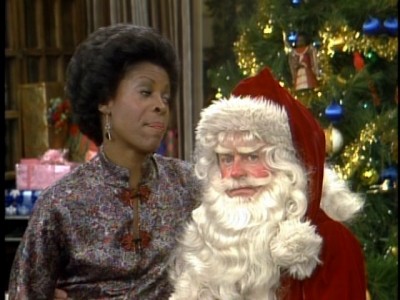
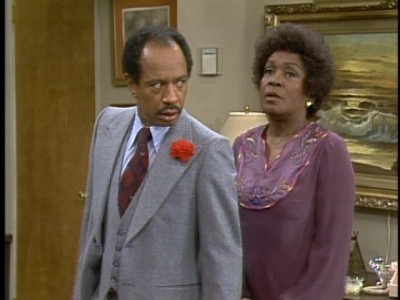
If anything, George's essentially positive attitude and his grudging willingness to meet whites halfway, make him a far more happy person than Archie, who tries unsuccessfully to cling to past ways. And that happiness is the lift in The Jeffersons's tone. And for that decision to stay essentially a "happy" sitcom farce, the critics either reviled The Jeffersons...or ignored it (its own "creator," Norman Lear, devotes a whopping 2 1/2 superficial pages to it--his longest-running, arguably most financially successful show--in his 450 page autobiography). TV critics (yeech) loved Lear back in the '70s because they--and Lear--believed he was doing something "better" than the television they had been watching for the past twenty years--which is nonsense, of course. His canon was just "different," not "better." I can find as much meaning (as say in an All in the Family episode), and as much surreal humor (as say in a Seinfeld episode), in something as reviled today as The Adventures of Ozzie and Harriet--but critics don't want to hear such favorable comparisons (it doesn't fit in with the Muzak of their group-think). So when The Jeffersons came out of the gate more "light" than "dark" (the set-ups abound here, don't they?), skipping the heavy dramatics of its host series AITF for a farcical, fast-paced Honeymooners Meets The Beverly Hillbillies hybrid, the critics screamed "sell out!" and "Uncle Tom-ism!" and wrote The Jeffersons off (particularly disgusting were the black writers and commentators who maligned and derided Hemsley's brilliant physical comedy as some kind of throwback to minstrel-like appeasement for white audiences).
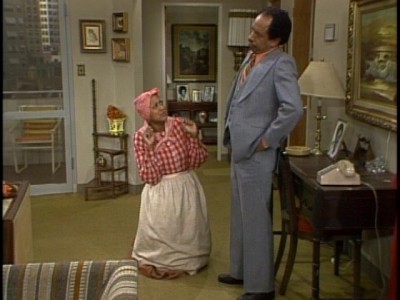
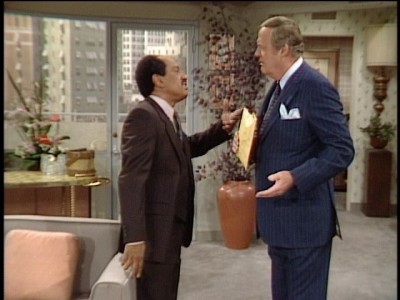
Luckily, nobody listens to critics, and The Jeffersons racked up a truly impressive 10 1/2 year run. It went up and down in the ratings, often because of where CBS moved it on its schedule--an insane 16 times...almost as if they wanted to kill it off--while later seasons sometimes felt a little tired or pat (...and while Hemsley and Sanford inevitably slowed down). However, no matter what the lines were, or what the silly situations, the performers carried the ball. Sanford, a potent combination of straightman and potential harpy wife, is the perfect foil to the bantam rooster George (until Marla Gibb's smart-assed Florence the maid character largely took over that role). I'm not sure what else can be said about Hemsley's portrayal of George: if you've seen it, even once, then you know it's a marvelously funny creation. Strutting around like a peacock, or glowering like an insane madman, the minute Hemsley got on his tip-toes before screaming some insult, or Sanford calmly crossed her arms and stared him down, or Gibbs took a perfect three-beat wait and blew Hemsley away with a withering put-down, The Jeffersons scored laughs. Repeatedly. Reliably. And that's all it had to do to secure a continuing audience that still watches it today in syndicated reruns...while its host series All in the Family is largely off the radar. All in the Family certainly has a place in the history books as one of the most influential sitcoms to ever grace the airwaves. No question. But if you took a still photo of Archie and Edith Bunker, and one of George and "Weezy" Jefferson (you're already grinning at that "Wheezy," aren't you?) and put both of those stills down in front of a TV child of the '70s, I can absolutely guarantee that that viewer is going to smile when they see Sanford and Hemsley. All in the Family has the respect...while The Jeffersons has the love.
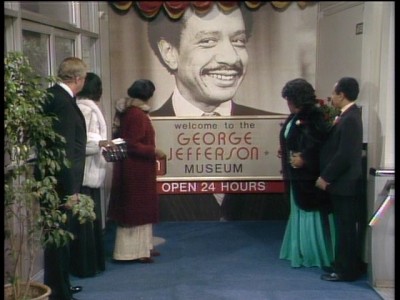
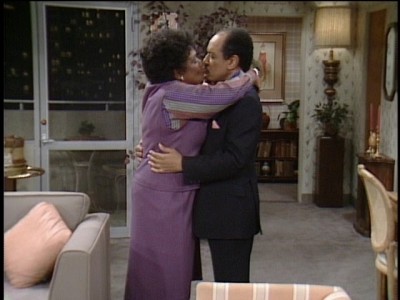
The Video:
Norman Lear's shows were the single worst looking TV shows on television. He'll tell you it was because he wanted them to look that way for aesthetic reasons (more immediacy, more like a stage play, more like the old live television kinescopes). I say because it was cheaper. No restoration of "boosting" of these fullframe, 1.37:1 transfers, so that means messy, smeary color, video noise, and a softish picture.
The Audio:
The Dolby Digital English mono audio track is acceptable, with low hiss and a reasonable re-recording level. English closed-captions are available.
The Extras:
Marginal. For Jeffersons completists, I suppose it's cool to see one episode of Marla Gibb's disastrous 4-episode "Florence" spin-off, Checking In (she works at a hotel...the rest you don't want to know), and see Hemsley-as-George get shot in the equally dire one-hour comedy, (one hour?) E/R, from 1984 (trust me: getting shot was nothing compared to what they make sad, defeated Elliott Gould do here...). But we've already seen the other two "bonuses": The Jeffersons Move Up, the fifth season All in the Family episode that saw the Jeffersons leave their host series, and the featurette, Movin' On Up, a superficial 17:00 look at the show from The Norman Lear Collection, with Lear saying silly things like no one else but Hemsley on TV could get away with saying "nigger" at that time (uh...paging Redd Foxx on NBC). There's also an episode guide booklet, with a typically P.C. "safe" essay by Washington Post (that says it all...) "TV critic" Tom Shales (his queasiness over "the N-word"--the guy won a Pulitzer and he's afraid of words--is quite amusing). I can't see these bonuses driving sales...but they won't hurt them, either.
Final Thoughts:
You don't need a summing up here, Jeffersons fans. You know The Jeffersons was a consistently funny--even frequently hilarious--farce for most of its 10 1/2 seasons, with a core cast of performers who delivered the goods, through tight scripts and thin ones. The transfers may not be perfect. The bonuses may be superfluous. But content rules here. The Jeffersons - The Complete Series: The Dee-Luxe Edition easily earns a "highly recommended" this Christmas season.
Paul Mavis is an internationally published movie and television historian, a member of the Online Film Critics Society, and the author of The Espionage Filmography.


|
| Popular Reviews |
| Sponsored Links |
|
|
| Sponsored Links |
|
|
| Release List | Reviews | Shop | Newsletter | Forum | DVD Giveaways | Blu-Ray | Advertise |
|
Copyright 2024 DVDTalk.com All Rights Reserved. Legal Info, Privacy Policy, Terms of Use,
Manage Preferences,
Your Privacy Choices | |||||||














